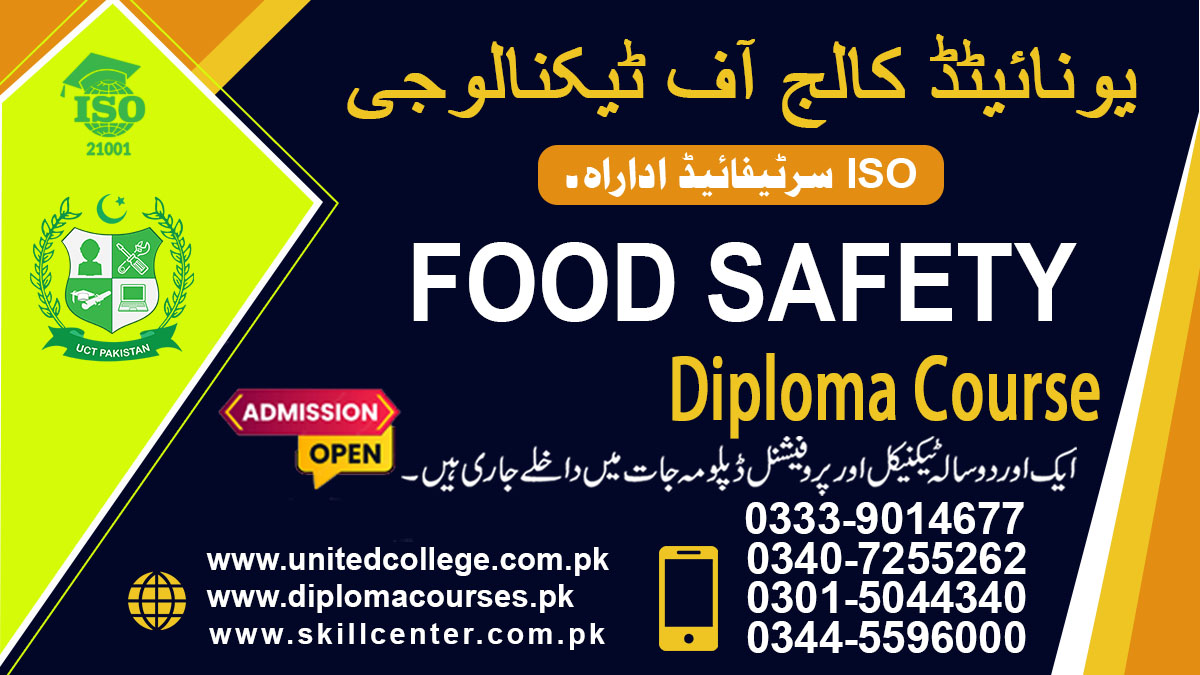Enhance Your Career with a Food Safety Course in Rawalpindi

In the food industry, ensuring the safety and hygiene of food is of paramount importance. With growing health concerns and the rise of foodborne illnesses globally, food safety has become a crucial focus for food handlers, businesses, and regulatory bodies. In Rawalpindi, where the food industry is expanding, there is an increasing demand for skilled professionals trained in food safety.
Enrolling in a Food Safety Course in Rawalpindi is a smart choice for anyone looking to pursue a career in the food sector or advance their existing skills. This course will equip you with the knowledge and skills necessary to maintain the highest standards of food hygiene and safety, ensuring compliance with local and international regulations.
In this article, we will explore the key elements of food safety, the benefits of enrolling in a food safety course, and how this training can open up career opportunities in Rawalpindi’s vibrant food industry.
Why Is Food Safety Important?
Food safety refers to the handling, preparation, and storage of food in ways that prevent contamination and foodborne illnesses. Poor food safety practices can lead to serious health consequences, including diseases caused by harmful bacteria, viruses, and toxins. The importance of food safety extends beyond consumer health; it is also a key factor in maintaining a business’s reputation and ensuring regulatory compliance.
Here are some reasons why food safety is critical:
1. Prevention of Foodborne Illnesses
Foodborne illnesses are caused by consuming contaminated food. Common pathogens like E. coli, Salmonella, and Listeria can lead to severe health issues and, in extreme cases, death. Food safety training helps food handlers prevent contamination by following proper hygiene and handling procedures, ultimately reducing the risk of outbreaks.
2. Compliance with Food Safety Regulations
In Pakistan, food safety is regulated by authorities like the Punjab Food Authority (PFA), which sets standards to ensure food products are safe for consumption. Businesses that fail to comply with these regulations can face fines, penalties, and even closure. A food safety course ensures that you understand these laws and know how to implement them in your food establishment.
3. Maintaining Business Reputation
Consumers are more aware than ever about food safety and hygiene. A single food safety incident can damage a business’s reputation, leading to lost customers and revenue. By employing trained food safety professionals, businesses can ensure that they provide safe food, build customer trust, and maintain a strong reputation.
4. Enhancing Food Quality
Food safety is not just about preventing illness—it’s also about maintaining the quality of the food. Proper handling, storage, and preparation techniques ensure that food retains its nutritional value, taste, and texture, leading to higher customer satisfaction.
What Will You Learn in a Food Safety Course?
A Food Safety Course in Rawalpindi offers comprehensive training in various aspects of food safety, equipping participants with the skills needed to excel in the food industry. Here’s what the course covers:
1. Foodborne Pathogens and Contamination Prevention
One of the first topics covered in a food safety course is foodborne pathogens and how they contaminate food. You will learn about the most common pathogens, including Salmonella, Campylobacter, and Norovirus, and how to prevent contamination through proper hygiene, food handling, and cooking practices.
2. Personal Hygiene for Food Handlers
Personal hygiene plays a vital role in preventing food contamination. The course teaches you how to maintain high standards of personal cleanliness, such as proper handwashing techniques, wearing clean uniforms, and using protective gear like gloves and hairnets.
3. Safe Food Handling and Storage
Proper food handling and storage are essential to preventing contamination and ensuring food remains safe for consumption. You will learn how to handle raw and cooked foods separately, maintain proper storage temperatures, and avoid cross-contamination in the kitchen.
4. Temperature Control
Bacteria and other harmful organisms can grow rapidly when food is kept at the wrong temperature. The course will cover the importance of temperature control in preventing foodborne illnesses, teaching you how to store, cook, and serve food at the correct temperatures.
5. Cleaning and Sanitizing
Keeping the kitchen and food preparation areas clean is essential for preventing contamination. The course will teach you proper cleaning and sanitizing techniques for kitchen equipment, utensils, and surfaces to maintain a hygienic environment.
6. Food Safety Regulations and Compliance
Understanding local and international food safety regulations is crucial for anyone working in the food industry. The course will cover the food safety laws enforced by the Punjab Food Authority (PFA) and international standards such as Hazard Analysis and Critical Control Points (HACCP). You’ll learn how to ensure that your business complies with these regulations and avoids penalties.
7. Allergen Awareness
With food allergies becoming more common, food safety courses also cover allergen awareness. You will learn how to handle allergens safely and prevent cross-contact, ensuring that customers with allergies can dine without risk.
8. Emergency Response and Food Recalls
In the event of a contamination incident or foodborne illness outbreak, it’s important to know how to respond quickly and effectively. The course will teach you how to initiate food recalls, report incidents, and take corrective actions to prevent future issues.
Benefits of Enrolling in a Food Safety Course in Rawalpindi
Taking a Food Safety Course in Rawalpindi comes with several advantages, especially for those looking to build a career in the food industry or enhance their skills. Here are some benefits:
1. High Demand for Trained Professionals
As Rawalpindi’s food industry continues to grow, there is an increasing demand for individuals trained in food safety. Businesses are looking for professionals who can ensure that food is handled safely and meets regulatory standards. Completing a food safety course gives you a competitive edge in the job market, making you more attractive to employers.
2. Career Advancement
For those already working in the food industry, a food safety certification can lead to career advancement. Many employers prioritize candidates who have undergone formal food safety training, and having this qualification can lead to promotions and higher-paying roles.
3. Improved Business Operations
For food business owners, investing in food safety training for staff can lead to more efficient and safe operations. Employees who are trained in food safety are better equipped to handle food correctly, reduce waste, and prevent costly mistakes like contamination incidents or food recalls.
4. Compliance with Local and International Standards
Food safety training ensures that you and your business comply with both local and international food safety regulations. This is especially important for businesses looking to expand or export their products, as compliance with international standards like HACCP is often a requirement.
5. Personal Confidence and Skill Development
By completing a food safety course, you’ll gain confidence in your ability to handle food safely and ensure the well-being of consumers. The skills you develop in the course will not only enhance your career but also help you maintain high standards in your daily life when preparing food at home.
Career Opportunities After Completing a Food Safety Course
Completing a Food Safety Course in Rawalpindi can open up a wide range of career opportunities in the food industry. Here are some of the roles you can pursue after obtaining your certification:
1. Food Safety Officer
Food safety officers are responsible for ensuring that food establishments comply with health and safety regulations. They conduct inspections, identify potential hazards, and advise businesses on how to improve their food safety practices.
2. Quality Control Manager
Quality control managers oversee the safety and quality of food products in manufacturing facilities. They ensure that food is produced according to safety standards and prevent contamination at every stage of the production process.
3. Restaurant Manager
Restaurant managers are responsible for overseeing the daily operations of a restaurant, including food safety. With a food safety certification, you’ll be better equipped to manage kitchen staff, enforce hygiene practices, and ensure compliance with health regulations.
4. Catering Manager
Catering managers handle large-scale food production for events. A food safety course provides the skills needed to ensure that food is handled and prepared safely, especially when catering to large groups of people.
5. Public Health Inspector
Public health inspectors work for government agencies, inspecting food establishments to ensure compliance with health regulations. They investigate complaints, conduct audits, and provide recommendations for improving food safety practices.
Why Choose Unitedcollege.com.pk for Food Safety Training?
At Unitedcollege.com.pk, we offer a comprehensive Food Safety Course designed to meet the needs of individuals and businesses in Rawalpindi’s food industry. Here’s why you should choose us for your training:
- Experienced Instructors: Our instructors have extensive experience in the food industry and are well-versed in local and international food safety standards.
- Hands-On Training: We believe in learning by doing, which is why our course includes practical, hands-on training in food handling and safety procedures.
- Flexible Scheduling: We offer flexible class schedules, including evening and weekend options, to accommodate working professionals.
- Affordable Fees: Our course fees are competitive, making quality food safety training accessible to everyone.
Conclusion
A Food Safety Course in Rawalpindi is essential for anyone looking to build a career in the food industry or improve their food handling skills. By completing this course, you’ll gain valuable knowledge that will help you ensure the safety of consumers, comply with regulations, and enhance the reputation of any food business. With the increasing demand for food safety professionals in Rawalpindi, now is the perfect time to invest in your future by enrolling in a food safety course atUnitedcollege.com.pk.
 Daily Blogger News Stay updated with the latest trends and insights. Your reliable source for daily updates and information.
Daily Blogger News Stay updated with the latest trends and insights. Your reliable source for daily updates and information.







